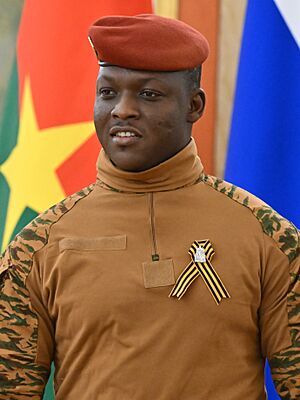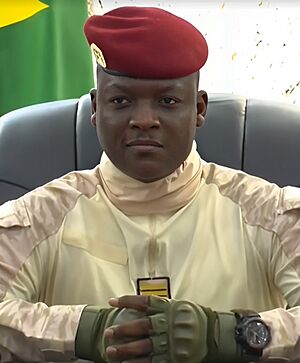Ibrahim Traoré facts for kids
Quick facts for kids
Ibrahim Traoré
|
|
|---|---|

Traoré in 2025
|
|
| President of Burkina Faso | |
|
Interim
|
|
| Assumed office 6 October 2022 |
|
| Prime Minister |
|
| Preceded by | Paul-Henri Sandaogo Damiba |
| 2nd President of the Patriotic Movement for Safeguard and Restoration | |
| Assumed office 30 September 2022 |
|
| Preceded by | Paul-Henri Sandaogo Damiba |
| 2nd President of the Confederation of Sahel States | |
| Assumed office 24 December 2025 |
|
| Preceded by | Assimi Goïta |
| Personal details | |
| Born | 14 March 1988 Kéra, Burkina Faso |
| Alma mater |
|
| Occupation | Military officer, politician |
| Nickname | "IB" |
| Military service | |
| Allegiance | |
| Branch | |
| Service years | 2009–present |
| Rank | |
| Unit | "Cobra" Special Forces Unit (disputed) |
| Battles/wars |
|
Ibrahim Traoré, born on March 14, 1988, is a military officer from Burkina Faso. He has been the interim president of Burkina Faso since 2022. He is known for his strong belief in his country's independence and for working with other African nations. Many young people find his leadership inspiring.
Traoré grew up in Kéra, a town in western Burkina Faso. He studied science and geology at the University of Ouagadougou, graduating in 2009. After college, he joined the Burkina Faso Armed Forces. He received military training in other countries, like Morocco and France. He gained experience fighting against armed groups in his country. In 2019, he even served in a United Nations peacekeeping mission in Mali.
In September 2022, Traoré became the leader of Burkina Faso. He was 34 years old, making him one of the youngest heads of state in the world at that time. Since then, he has changed Burkina Faso's relationships with some countries, like France. He has also built stronger ties with nations such as Russia, Turkey, and China, as well as neighboring countries like Mali and Niger. He helped create the Alliance of Sahel States, a group of countries working together.
Contents
Early Life and Schooling
Ibrahim Traoré was born on March 14, 1988, in Kéra, a town in Burkina Faso. He went to primary school in Bondokuy. Later, he attended high school in Bobo-Dioulasso, a large city in Burkina Faso. People remembered him as a quiet and very smart student.
From 2006, he studied geology at the University of Ouagadougou. During his time there, he was involved in student groups. He was known for standing up for his fellow students. He finished his university studies with excellent grades.
Military Service
Traoré joined the Army of Burkina Faso in 2009. He completed his military training at the Georges-Namoano Military Academy. He received special training in Morocco. Later, he worked with an infantry unit in northern Burkina Faso.
In 2014, he became a lieutenant. He then joined MINUSMA, a United Nations peacekeeping mission in Mali. This mission worked to keep peace during the Mali War. In 2018, he was recognized for his bravery during attacks by armed groups in Mali. After this, he returned to Burkina Faso. He helped in efforts to fight against armed groups in his home country. He took part in several important operations in the north of Burkina Faso.
He was promoted to Captain in 2020. Around this time, Traoré felt that the country's leaders were not doing enough for the soldiers. He noticed that soldiers often lacked proper equipment. He became a voice for soldiers in the north who were concerned about the situation.
Becoming a Leader
Traoré was part of a group of army officers who supported a change in leadership in January 2022. This change brought the Patriotic Movement for Safeguard and Restoration to power. From March 2022, he led an artillery unit in Kaya. There is some discussion about whether he was part of a special counter-terrorism unit called "Cobra." Some news sources say he was, while others say he was not.
Many people who supported the January 2022 change became unhappy with the new leader, Paul-Henri Sandaogo Damiba. They felt he was not doing enough to stop the armed groups. Traoré and other officers tried to encourage Damiba to focus more on this issue. However, they eventually decided to make another change in leadership. Young officers, especially those fighting on the front lines, were particularly concerned. There were also issues with soldiers not being paid on time.
On September 30, 2022, Traoré, who was still a Captain, led a new change in leadership. This action was supported by the "Cobra" unit. After this event, Traoré was chosen as the new head of the Patriotic Movement for Safeguard and Restoration. On October 6, he became the interim president, serving as the Head of State and leader of the armed forces. He initially said that new elections would be held in July 2024.
As President
As president, Traoré has maintained a serious and formal style. He carefully manages how he communicates, often presenting himself as a leader focused on security. During his time in office, there has been more government-supported information shared through news and social media in Burkina Faso.
In 2023, Traoré suggested that elections planned for 2024 might need to be delayed. He believed that elections could only happen once the armed groups were pushed back and the country was safer. This was a change from an earlier promise to hold elections within two years.
On September 26, 2023, some parts of the military tried to remove Traoré from power, but they were not successful. In May 2024, meetings were held to discuss the country's future. Many political parties did not attend these meetings. As a result, Traoré's term as interim president was extended for five more years. He was also allowed to run in future presidential elections.
On December 6, 2024, Traoré changed his government and appointed a new prime minister. Later that month, the government pardoned 21 former military officers. These officers had been found guilty of involvement in a previous attempt to change the government in 2015.
In April 2025, Traoré's government announced that it had stopped another planned attempt to change the government. They said that the government of Côte d'Ivoire was involved. In early January 2026, Burkina Faso reported that another attempt to harm the president was prevented. This was the fifth such attempt in Burkina Faso in the last three years.
Boosting the Economy
Managing Natural Resources
In November 2023, the government approved building Burkina Faso's first gold refinery. This was a big step for the country's growing gold mining industry. Traoré wants Burkina Faso to process its own gold instead of sending it out of the country raw. This helps the government earn more money and creates jobs. The refinery was expected to create 100 direct jobs and 5,000 indirect jobs.
In February 2024, Traoré stopped the permits for exporting small amounts of privately mined gold. This was done to stop illegal trading, like smuggling gold out of the country without paying taxes. The government wanted to make sure all exported gold was properly recorded and contributed to the country's income.
In December 2024, Traoré opened a new tomato-processing plant. This plant can process about five tonnes of tomatoes every hour. It aims to make tomato paste and other tomato products.
In 2025, Burkina Faso started taking more control over foreign-owned mining companies. This was part of a plan to gain more power over its natural resources. In April 2025, the Prime Minister announced that the government would continue to expand its control over large mines. A new state-owned mining company, SOPAMIB, was created. By then, SOPAMIB had already taken control of two gold mines. These actions helped increase the amount of gold collected by the state. In 2024, state-controlled groups collected over 8 tonnes of gold. In just the first three months of 2025, they collected more than 11 tonnes.
In June 2025, a presidential order transferred five more gold mining assets to SOPAMIB. These included two operating mines and three exploration licenses. At that time, Burkina Faso was the fourth-largest gold producer in Africa.
Social Changes
Traoré's government has made changes regarding how news is shared. In March 2023, they stopped the French news channel France24 from broadcasting. This happened after the channel aired an interview with a leader of an armed group. Several months earlier, another French radio station was also banned for similar reasons.
In June 2024, four Burkinabé journalists who had criticized the government were held. A few months later, the government announced that three of them had been asked to join the military. In March 2025, three more journalists were held and asked to join the military.
Military Actions
Fighting against armed groups has been a main focus for Traoré's presidency. In his first month, his government started a big campaign to recruit 50,000 people for a volunteer defense force (VDP). In April 2023, Traoré called for everyone to help the military. This was because armed groups were increasing their attacks. Traoré promised to take back all areas controlled by these groups. He said there would be no talks until the armed groups were much weaker. In July 2023, his government added new taxes to raise money for the military. These included a 5% tax on phone and internet bills.
In May 2024, Traoré asked the people of Burkina Faso to help the military dig trenches around towns. In August 2024, armed groups attacked civilians who were digging trenches near the town of Barsalogho. The military had ordered these trenches to be dug. Traoré faced criticism for supporting the use of civilians for this work.
Reports from ACLED indicate that the Burkinabé military and VDP militias were involved in the deaths of over 1,000 civilians between January and July 2024.
Awards and Honors
See also
 In Spanish: Ibrahim Traoré para niños
In Spanish: Ibrahim Traoré para niños
 | Mary Eliza Mahoney |
 | Susie King Taylor |
 | Ida Gray |
 | Eliza Ann Grier |


